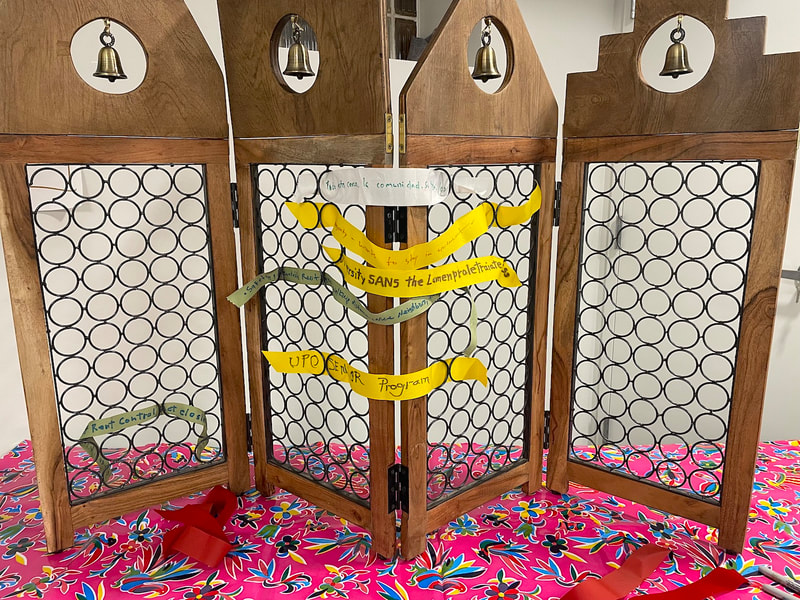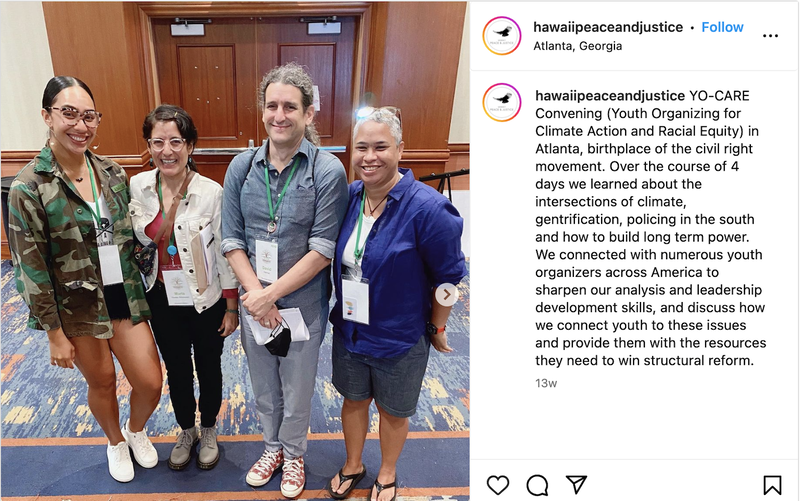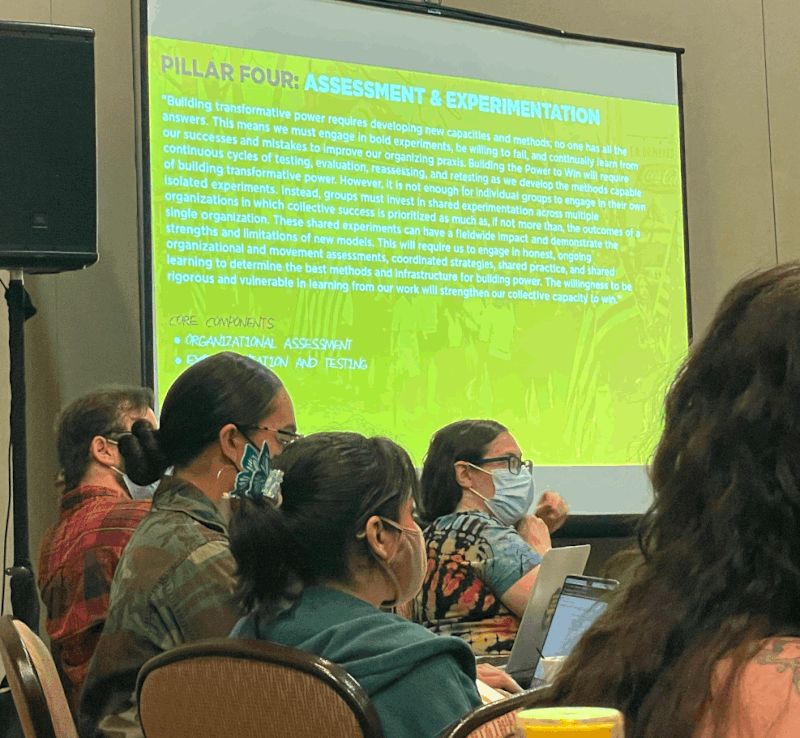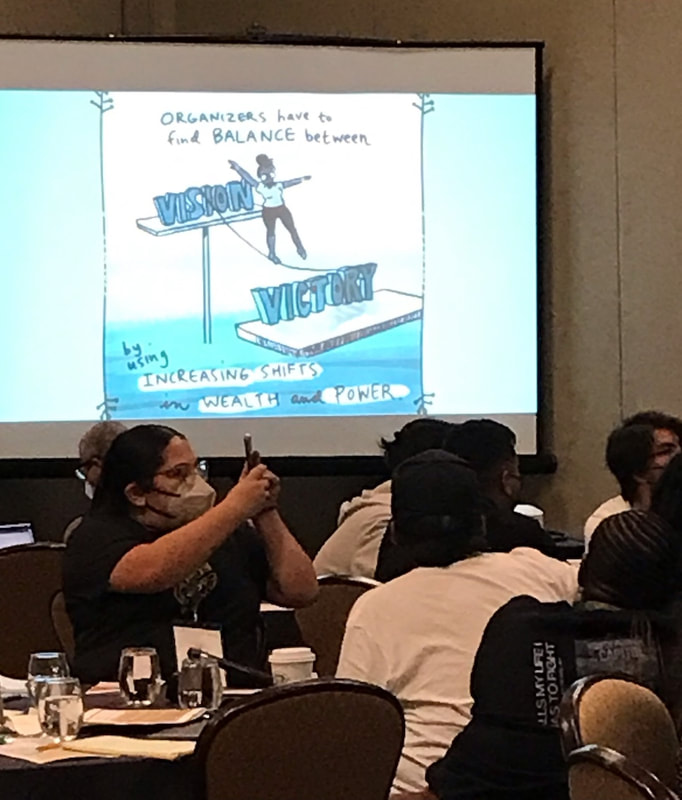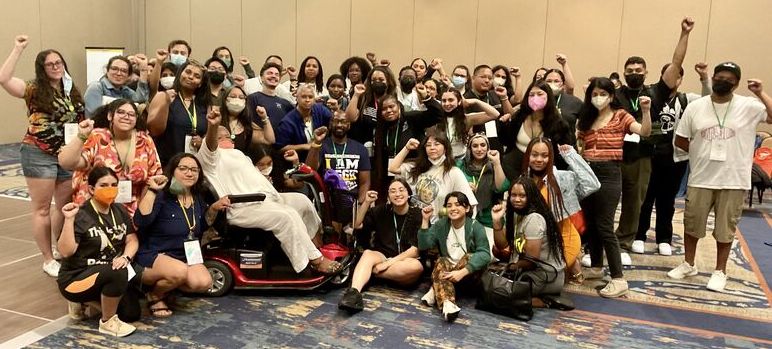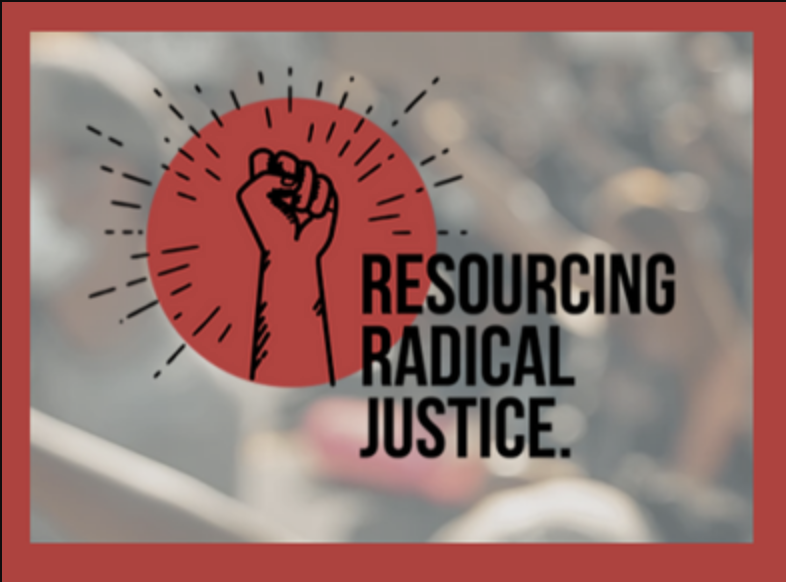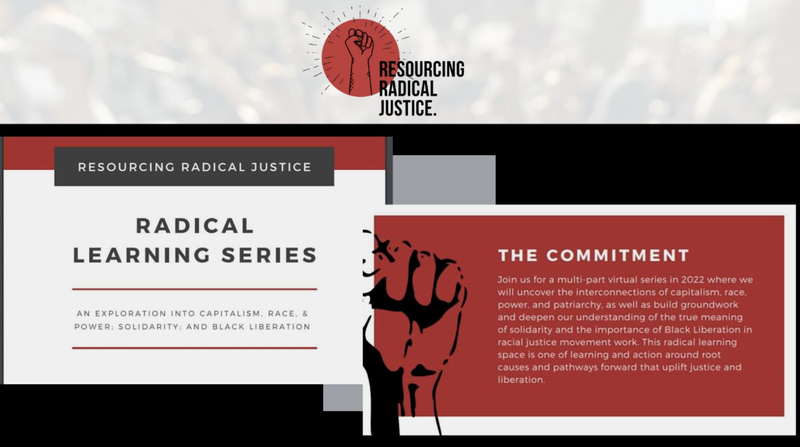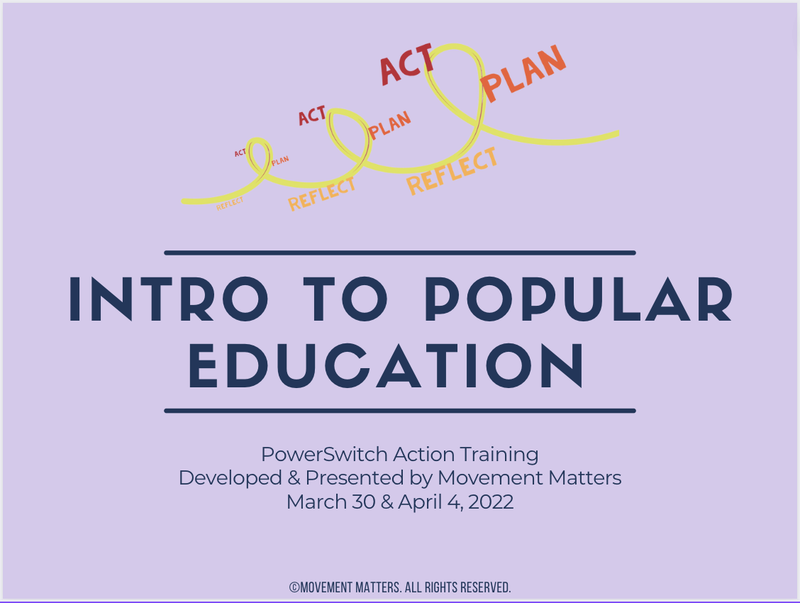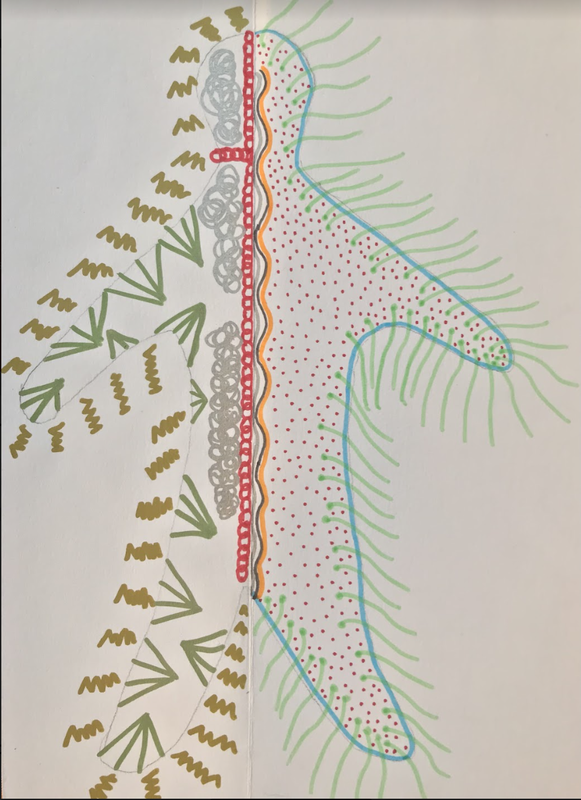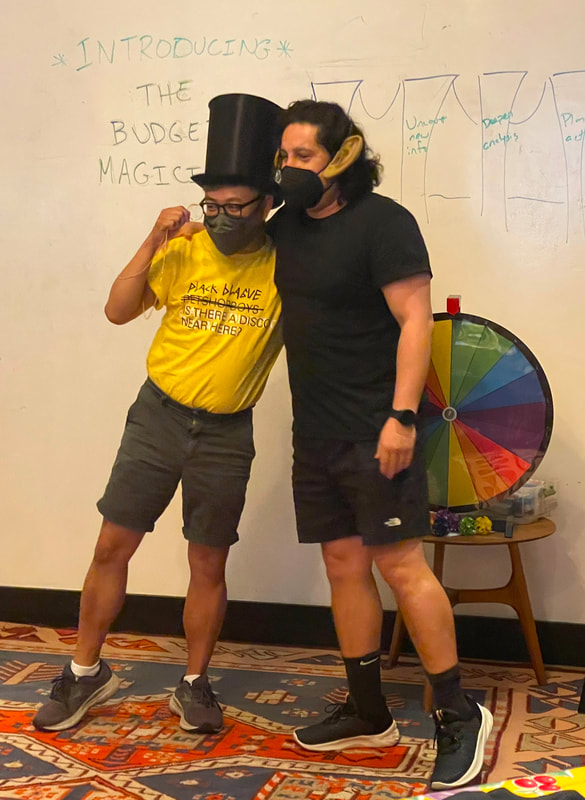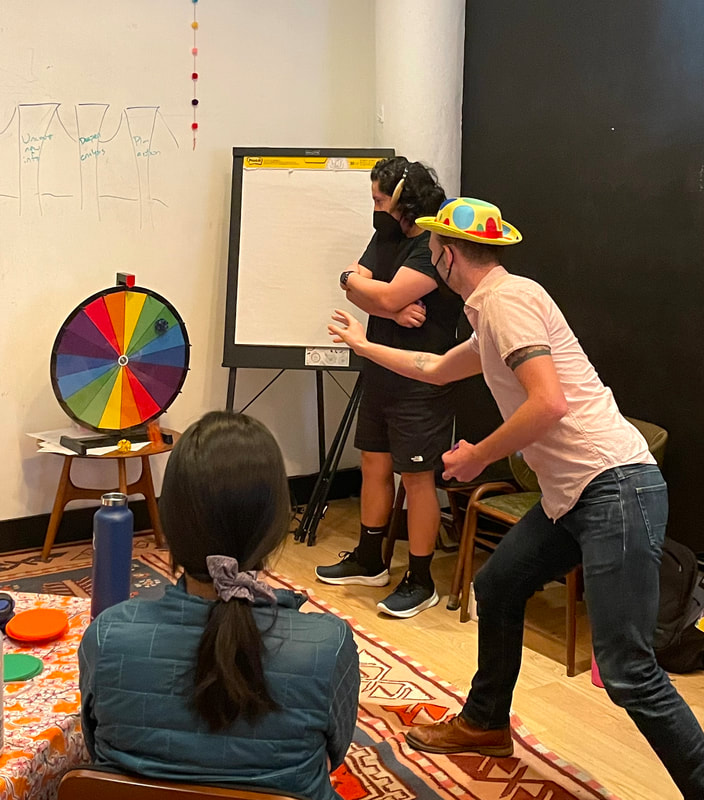|
Since April of 2022, Movement Matters has been working in collaboration with several legal service providers, social workers and community organizing groups in a joint project to keep DC tenants in their homes by fighting evictions. With the end of the COVID eviction moratorium and an absence of city funding and leadership on this issue, several thousand DC residents face eviction each month. In response to these conditions, Eviction Prevention in Communities (EPIC) has been building up a canvassing apparatus to ensure that tenants who are facing evictions know their options and are connected to long-term infrastructure to build tenant power. This month, EPIC launched the Eviction Defense Hub. This "Hub" is modeled after Silicon Valley DeBug's participatory defense project in the criminal courts, which allows individuals and communities to take back agency over their involvement with the overly bureaucratic and puzzling "criminal justice" system. Organizers from the Latino Economic Development Center's Tenant Organizing Team, Empower DC, DC Jobs with Justice, Bread for the City, and Movement Matters have adapted this tool to landlord-tenant court. Movement Matters has helped to ensure that Hub meetings incorporate cultural organizing and popular education to create stronger bonds among tenants and connect to the deeper values of anti-eviction work. We are also assisting community partners to develop strategic organizing responses to issues that surface during Hub meetings. The Hub comes at a time when government rental assistance and tenant protections are either being diminished or eliminated by the DC City Council and Mayor while landlord attempts to evict tenants are rising at alarming rates with no end in sight. Eviction Defense Hub weekly meetings build solidarity and mutual aid among tenants, encourage knowledge and skill sharing between those in the eviction process, and strengthen sustainable long-term collective power by surfacing deeper systemic issues and potential structural solutions. Connect with us for more information on MM's Technical Assistance and Action Coalitions work. Movement Matters is based in Washington, DC. We work regionally with various communities and with national partners. Over the last year, Movement Matters partnered with the Organizing Center and the Funders' Collaborative for Youth Organizing (FCYO) to provide direct coaching to youth organizing groups working on climate justice and racial equity as part of FCYO's Youth Organizing for Climate Action and Racial Equity (YO-CARE) Capacity-Building Fund. We were thrilled to develop new meaningful relationships spanning the country, from Youth Ministries for Peace and Justice (Bronx, NY) to Juntos (Philadelphia, PA) to Florida Rising to Hawai'i Peace & Justice to Latinos Unidos Siempre/LUS Youth (Salem, Oregon) to one of our local partners in the DC region, Progressive Maryland. These powerful groups were eager and ready to implement new ideas and practices to level up their base building and organizing skills. In addition to helping individual groups work on popular education curricula, cultural organizing and somatic-based activities, member engagement systems, and campaign strategies, we were also excited to be part of the facilitation team for FCYO's convening of 50+ organizers from YO-CARE grantee organizations this past summer in Atlanta. A critical part of this gathering was a deep engagement with FCYO’s Power to Win Framework, which helped to stretch youth organizers’ thinking about how to approach long-term movement building. This orientation is deeply aligned with Movement Matters’ organizing framework and the way we engage partners when doing capacity building work. It was a pleasure to support the learning and integration of this model and to be in partnership with such a significant cohort of youth leaders from around the country. Connect with us for more information on MM's Technical Assistance. Movement Matters is based in Washington, DC. We work regionally with various communities and with national partners. Providing support and accompaniment to organizers and community workers is a critical part of the way Movement Matters supports our collective struggle for justice. However, we recognize that those working on the ground are only part of the movement ecosystem. We are also excited when the opportunity presents itself to accompany funders who are interested in supporting transformative work. Over the last two years, Movement Matters has been partnering with Resourcing Radical Justice (RRJ), a funders collective that centers Black liberation as the path to a thriving Greater Washington region by advocating for philanthropic sector transformation, coordinating capacity building for and funding to Black and POC-led grassroots organizers, and building, lifting up, and learning from radical organizers. Our Movement Matters team played two distinct roles in RRJ’s Radical Learning Series process: helping to structure and ground the development of a learning cohort and providing content training to the cohort once it had been developed. RRJ drew on our expertise in creating values-driven, body-and-mind centered processes to help them envision the arc of their cohort design―from the application process to the learning modules to the post-workshop integration of knowledge, skills, and values. Those doing “professional” training for funders often overlook the need to allow participants to connect to their bodies, minds, and spirits as they navigate systems that may resist change. We provided concrete ways for RRJ to utilize arts and culture to avoid these traps and help participants deeply connect to new ways of thinking about funding and to navigate (personally and professionally) the obstacles they might face in implementing new approaches within their organizations. In addition to this overall framing, Movement Matters also designed and ran two training modules within the RRJ curriculum. These modules focused on understanding how philanthropy can both support and hinder movement work for systems change and racial justice, both in terms of what they fund and how they fund it. We drew on our deep knowledge of various philanthropic efforts to support community organizing, racial equity and systems change work in the DC area over the last 25 years in crafting the training content. We helped RRJ cohort members critically reflect on and ground themselves in philanthropic practices that contribute more consistently and meaningfully to a healthy movement ecosystem. As always, these workshops were deeply rooted in Movement Matters’ popular education approach and resonated strongly with the RRJ cohort. Helping those who organize money to be aligned with movement organizing in their vision, values, and practice is a critical part of a multi-pronged approach to creating change. We were happy to be able to partner with RRJ to do this kind of transformational work with funders in the region. Connect with us for more information on MM's Funder Training and Technical Assistance . Movement Matters is based in Washington, DC. We work regionally with various communities and with national partners. Budget processes are designed to be intimidating and minimize public ownership. Yet so many of our struggles rely on budgetary processes to succeed. Our team recently spent two days with PowerSwitch Action to help them incorporate popular education into their budget organizing work and build tools to demystify the budget process. We started our work with PowerSwitch and their regional budget partners earlier in the year with our “Popular Education 101” training to orient the group toward creating liberatory community engagement and how to open and facilitate spaces for such engagement. Given how alienating the budget process is designed to be, grounding budget work in popular education is critical to facilitate a sense of community vision and ownership over the process. At our recent two-day gathering, we built community with the PowerSwitch cohort (also as a means to drive deeper that skill-set) and developed concrete tools—including popular education codes—that they can to use in their home communities. Our approach to popular education, including the importance of ritual, play and (physical) movement, has insured that PowerSwitch is approaching budget work as integral parts of popular education, especially when dealing with a potentially intimidating topic like budgets. We look forward to supporting PowerSwitch partners as they implement these tools in their home communities! For more information on our Popular Education Approach or to inquire about Technical Assistance, connect with us. Movement Matters is based in Washington, DC. We work regionally with various communities and with national partners. The Rockefeller Foundation’s US Equity and Economic Opportunity team is beginning to fund worker organizing in four states. They have contracted Movement Matters to strengthen their understanding of how to support the work and to provide protocols and practices to best enter the field. As in our work with other funders, we grounded our process in a detailed understanding of organizing as a distinct change strategy, clarifying how it relates to and is different from other modes like service provision and policy advocacy. We have examined best practices to recognize and address funder-grantee power dynamics, especially when it comes to supporting grassroots efforts. We have also provided models for funder support of short and long term change strategies, and identified ways to shift philanthropic culture to be more responsive to the needs of organizations on the ground. We are excited to continue this partnership as the Rockefeller team begins to make grants and support the work. Connect with us for more information on our Funder Training and Technical Assistance work. Movement Matters is based in Washington, DC. We work regionally with various communities and with national partners. We are thrilled to announce our partnership with the Indigenous Environmental Network (IEN) to develop popular education curricula for IEN's Indigenous Principles of Just Transition and support in the building of their Just Transition Program. IEN’s principles capture key elements about our relationship to Mother Earth, the immutable importance of Indigenous sovereignty, and the critical role of Indigenous knowledge in transitioning from an exploitative economy to one that fosters life and harmony. We cannot undo the harm we have done to the planet without addressing the destruction of settler colonialism. Climate justice cannot be achieved without centering Indigenous solutions and recognizing Indigenous sovereignty. We are excited to partner with IEN on this significant project! For more information on MM's Curriculum Development or Popular Education expertise, connect with us. Movement Matters is based in Washington, DC. We work regionally with various communities and with national partners. |
AuthorsMOVEMENT MATTERS Archives
October 2023
Categories
All
|

